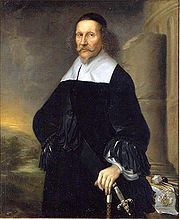
Georg Stiernhielm
Encyclopedia

Sweden
Sweden , officially the Kingdom of Sweden , is a Nordic country on the Scandinavian Peninsula in Northern Europe. Sweden borders with Norway and Finland and is connected to Denmark by a bridge-tunnel across the Öresund....
civil servant, linguist and poet. Stiernhielm was born in a middle-class family in the village Svartskär in Vika parish in Dalarna
Dalarna
', English exonym: Dalecarlia, is a historical province or landskap in central Sweden. Another English language form established in literature is the Dales. Places involving the element Dalecarlia exist in the United States....
. The surname Stiernhielm, literally "Star Helmet", was taken in later life when he was raised into the Swedish nobility
Swedish nobility
The Swedish nobility were historically a legally and/or socially privileged class in Sweden, part of the so-called frälse . Today, the nobility is still very much a part of Swedish society but they do not maintain many of their former privileges...
.
He grew up in the Bergslagen
Bergslagen
Bergslagen is a historically, culturally, and linguistically distinct mining district located north of Lake Mälaren in northern Svealand, Sweden. In Bergslagen mining and metallurgic industry have been important since the Middle Ages...
region where his father worked with the mining industry. Stiernhielm received his first schooling at Västerås
Västerås
Västerås is a city in central Sweden, located on the shore of Lake Mälaren in the province Västmanland, some 100 km west of Stockholm...
, but he was also educated in Germany
Germany
Germany , officially the Federal Republic of Germany , is a federal parliamentary republic in Europe. The country consists of 16 states while the capital and largest city is Berlin. Germany covers an area of 357,021 km2 and has a largely temperate seasonal climate...
and the Netherlands
Netherlands
The Netherlands is a constituent country of the Kingdom of the Netherlands, located mainly in North-West Europe and with several islands in the Caribbean. Mainland Netherlands borders the North Sea to the north and west, Belgium to the south, and Germany to the east, and shares maritime borders...
.
He was a pioneer of linguistics, and even if many of his conclusions later proved wrong they were accepted by his contemporaries. Stiernhielm tried to prove that Gothic
Gothic language
Gothic is an extinct Germanic language that was spoken by the Goths. It is known primarily from the Codex Argenteus, a 6th-century copy of a 4th-century Bible translation, and is the only East Germanic language with a sizable Text corpus...
, which he equated with Old Norse
Old Norse
Old Norse is a North Germanic language that was spoken by inhabitants of Scandinavia and inhabitants of their overseas settlements during the Viking Age, until about 1300....
was the origin of all languages, and that the Nordic countries were Vagina gentium, the human birth place.
His most famous work is "Hercules", an epic poem in hexameter
Hexameter
Hexameter is a metrical line of verse consisting of six feet. It was the standard epic metre in classical Greek and Latin literature, such as in the Iliad and Aeneid. Its use in other genres of composition include Horace's satires, and Ovid's Metamorphoses. According to Greek mythology, hexameter...
, about how Hercules
Hercules
Hercules is the Roman name for Greek demigod Heracles, son of Zeus , and the mortal Alcmene...
in his youth is being tempted by Fru Lusta ("Mrs. Lust") and her daughters to choose an immoral lifestyle for his future. The allegory can be traced back to the Athenian sophist Prodicus
Prodicus
Prodicus of Ceos was a Greek philosopher, and part of the first generation of Sophists. He came to Athens as ambassador from Ceos, and became known as a speaker and a teacher. Plato treats him with greater respect than the other sophists, and in several of the Platonic dialogues Socrates appears...
of Ceos, as preserved in Xenophon
Xenophon
Xenophon , son of Gryllus, of the deme Erchia of Athens, also known as Xenophon of Athens, was a Greek historian, soldier, mercenary, philosopher and a contemporary and admirer of Socrates...
.
Stiernhielm was the first Swedish poet to apply the verse meters of antique poets to the Swedish language, modifying their principle of long and short syllables to a principle of stressed and unstressed syllables, which better suits the phonology of Swedish, using ideas first developed by Martin Opitz and later theoretically applied to Swedish by Andreas Arvidi. This made him known as "the father of Swedish poetry".
He was elected a Fellow of the Royal Society in December 1669.

